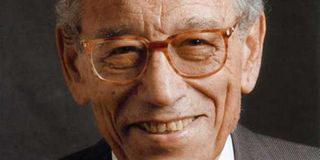Boutros Boutros-Ghali, former UN Secretary General, dies aged 93

This file photo taken on November 17, 2001 shows the former United Nations Secretary-General Boutros Boutros-Ghali in Marseille. Boutros-Ghali died on February 16, 2016 aged 93 years old. PHOTO | AFP
What you need to know:
He took office in 1992 at a time of increasing influence for the world body following its decisive role in the Gulf War, serving one five-year term.
The 15-member Security Council observed a minute's silence after the announcement, which was made at the start of a session on Yemen's humanitarian crisis.
A former Egyptian foreign minister, Mr Boutros-Ghali led the world body during one of its most difficult times, with crises in Somalia, Rwanda, the Middle East and the former Yugoslavia.
Boutros Boutros-Ghali, the former secretary general of the UN, has died aged 93.
He died at a Cairo hospital on Tuesday, Egypt's state news agency said, after reportedly being admitted with a broken pelvis.
His death was confirmed by Rafael Ramirez, the Venezuelan ambassador to the UN and current president of the UN Security Council.
As an Egyptian, Mr Boutros-Ghali was the first Arab to serve as UN chief.
He took office in 1992 at a time of increasing influence for the world body following its decisive role in the Gulf War, serving one five-year term.
The 15-member Security Council observed a minute's silence after the announcement, which was made at the start of a session on Yemen's humanitarian crisis.
No further details on his death were immediately available.
Mr Boutros-Ghali had received a phone call from Egyptian President Abdel Fattah al-Sisi last Thursday, after being admitted to hospital, Egyptian press reported.
CONTROVERSY
A former Egyptian foreign minister, Mr Boutros-Ghali led the world body during one of its most difficult times, with crises in Somalia, Rwanda, the Middle East and the former Yugoslavia.
His five years in office were clouded by controversy, especially about perceived UN inaction over the 1994 Rwandan genocide and Angolan civil war of the 1990s.
To some, he was an effective diplomat who was caught in a rift between the UN and the United States. Others, most notably in Washington, saw him as a symbol of all that was wrong with the organisation.
He was often jeered, and often waded into crowds to confront protesters when security guards permitted. "I am used to fundamentalists in Egypt arguing with me," he told Reuters.
He shocked many in Sarajevo when he said he was not trying to belittle the horrors in Bosnia but that there were other countries where the "total dead was greater than here".
He was born on 14 November 1922 into a Coptic Christian family in Cairo, and educated at Cairo University and in Paris, where he established a lifelong connection with France.
He went on to study international relations at Columbia University in New York and became Egypt's foreign minister in 1977, under president Anwar al-Sadat.
After leaving the UN, Mr Boutros-Ghali served from 1998 to 2002 as secretary general of La Francophonie - a grouping of French-speaking nations.
In 2004, he was named the president of Egypt's new human rights council, a body created by then-Egyptian leader Hosni Mubarak amid US pressure on Arab nations for democratic reform.




